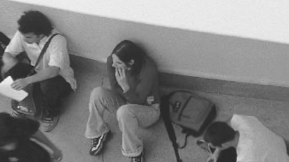Naked in Santiago
A Look at Chilean Media

Destape: the heady response to Spencer Tunick’s project of nude photographs in a Santiago park. Photo courtesy of El Mercurio
On a freezing winter Sunday morning in July 2002, four thousand people euphorically took off their clothes in a downtown Santiago park. Spencer Tunick, the American photographer working on a project of nude pictures in public spaces, could not believe the scene in front of his lens. Neither could millions of Chileans who watched this collective catharsis on television: grannies, couples, children, naked people of all sizes and ages and social classes jumping and hugging each other while shouting “I feel free” and “I have nothing to hide.” That happy mass of flesh marked the start of the Chilean destape.
Destape. It is strange that there is no such concept in English. It is a blend of uncovering, untying and liberalizing, all at once—a bit like the lifting of a lid that has covered the simmering stew for too long. After 40 years of dictatorship in Spain, it took only six months for a magazine like Interviú to become a success thanks to a bombastic combination of tits, ass and independent journalism. Chileans, having lived through 17 years of dictatorship, had to wait 15 more years for their own version of destape to take place.
As in Spain and later in post-authoritarian Argentina, the Chilean destape has been a heady mix of sex and freedom of expression. Some of it is playful, bold or downright silly. Television audiences have recently turned a prostitute who swindled a Japanese con man into a national public figure. They have gone crazy over reality shows that allow them to snoop around the private life of young people desperate for fame. And massive numbers of them have tuned in to watch a soap opera in which one of the protagonists is gay and another has a sexual dysfunction—a show that ironically enough aired on a Catholic TV network.
But some of the new material is dead serious. In the last eighteen months, Chileans have learned of corruption in the government and of Catholic priests molesting children. They have endlessly revisited every painful aspect of the 1973 coup on its 30th anniversary. Television viewers have seen public figures—from judges to celebrities—come out of the closet and openly discuss their homosexuality.
The shift has deep political implications. Now that they can peek into the private lives of celebrities, television audiences and newspaper readers also want to know what their leaders are really up to. As never before, Chileans are demanding transparency at every level. For most of the 1990’s Chileans had been persuaded by the ruling elites that the democratic transition required stability, homogeneity and consensus to succeed. Challenging authority or even expressing a dissenting opinion was perceived as dangerous and threatening to the newborn democracy.
Not any more. Nowadays Chileans value diversity, honesty and dissent because they understand that these values make democracy stronger. These are not abstractions, but concrete realities. So much for not having a divorce law when 56 percent of Chilean children are born out of wedlock. So much for being told what movies to watch (a censorship law was finally repealed in 2002). So much for a media that do not truly depict what Chileans are like in the 21st century.
It took a while for the conservative elites that historically controlled the Chilean media to realize how disconnected they were from their audiences. As Roberto Mendez, the director of a leading Chilean polling firm, has said, it took a multitude of naked people for the media to realize they were ignoring the new Chile.
The Internet, the rise of cable television and the appearance of an alternative and independent press (the best example of which is the satirical bi-weekly “The Clinic,” named after the London establishment where Augusto Pinochet was arrested in 1998) have also forced the traditional media to react. In an increasingly competitive market—with five national networks, 198 cable stations, 1,297 radio stations, 236 newspapers and 1,597 magazines—traditional media have to adapt or to die. Goodbye press releases and spokespersons. Welcome hidden cameras and unnamed sources.
Journalists are learning to be inquisitive and editors are constantly looking for the scoop that will uncover the next scandal. It can be as serious as a politician taking bribes from a businessmen or as futile as a comedian cuckolding his wife. The era of secretiveness and the double standard is coming to an end. One consequence is the blurring of the thin line dividing the public and private spheres. In one of the latest scandals, a judge was discovered to frequent gay sauna baths. A debate over whether homosexuals can serve as judges has ensued. In Europe or North America, the question might be moot. In Catholic Chile it is not—at least not yet.
It is revealing to notice that the same glamorous TV presenter who. in the 1980s, was fired from a Catholic TV station for saying that she would have a child with or without a marriage license, now makes regular appearances in the talk shows of the same station to discuss her recent marital infidelities. “Well, why not if her presence gives high ratings?” a media executive may argue.
If that is what people want, give it to them. The new media principle is to treat the public as the ultimate consumer. The power of the remote control has extended to the phone. Chileans are increasingly calling in and giving their opinion live on the air; or they dial pound and decide who stays in the reality show that evening. People feel as though they have a say in what they watch and read. While it may be only an illusion of influence, that is not the point. What is relevant is that the media, particularly television, are now part of the destape and are pushing it to its limits.
This is particularly evident in the case of television. As sociologist Eugenio Tironi observes, it is ironic that television, the most heavily repressed and censored medium during the dictatorship, is the one now testing the newfound tolerance of Chile’s democracy for unrestricted freedom of speech. Intellectual elites may think Chilean TV has turned vulgar and irrelevant. But the Chilean people are consuming that “vulgar” stuff at an impressive average rate of three hours and thirteen minutes per day.
Even old-style newspapers are fighting to catch up. Competition from La Tercera for high-income readers has forced stodgy El Mercurio to become more agile—and, recently, a bit less conservative politically. But the biggest change involvesLas Ultimas Noticias, a once-sleepy mid-brow paper also belonging to the El Mercurio group. LUN, as it is known in Chile, has put into place a system that may well be unprecedented anywhere: the paper’s contents are largely determined by which items in LUN’s website get the most hits on the previous day. As a result, the sexual escapades of soap opera stars and sports celebrities dominate the headlines. LUN has quickly become Chile’s most widely circulated newspaper, with more than 180,000 copies sold on an average day.
Chilean media are a work in progress. They are struggling to strike a balance between scrutiny and respect for privacy and human dignity. They may err along the way, but they are learning fast. And so are audiences. They may be demanding tacky variety shows, but they also desire better reporting and plainer answers from politicians. In the process, those who never before withstood much scrutiny—congressmen, political party leaders, media moguls, corporate chieftains and even bishops—are discovering that they, too, may be naked in the park.
Spring 2004, Volume III, Number 3
Consuelo Saavedra is a Chilean journalist and TV news anchor. A former Nieman Fellow at Harvard University, she is currently pursuing a Master’s degree at Harvard’s Kennedy School of Government
Related Articles
Poverty or Potential?
Teresa stops me three blocks from Nueva Imperial’s main plaza on a quiet Wednesday morning, eager to chat. She is wearing a light blue sweater and a matching blue headband glowing slightly against her dark black hair.
Editor’s Letter: Chile
I was hesitant to do an issue on Chile when I had other topics broader and richer in content. Although in a way Chile seems like an obvious choice because of the DRCLAS Regional office there, I felt there were other priorities in terms of substance.
Three Students, Three Experiences
I was extremely impressed with how successful the Chilean health system has been in improving the health of its citizens despite its limited resources. Its success, however, in many…




